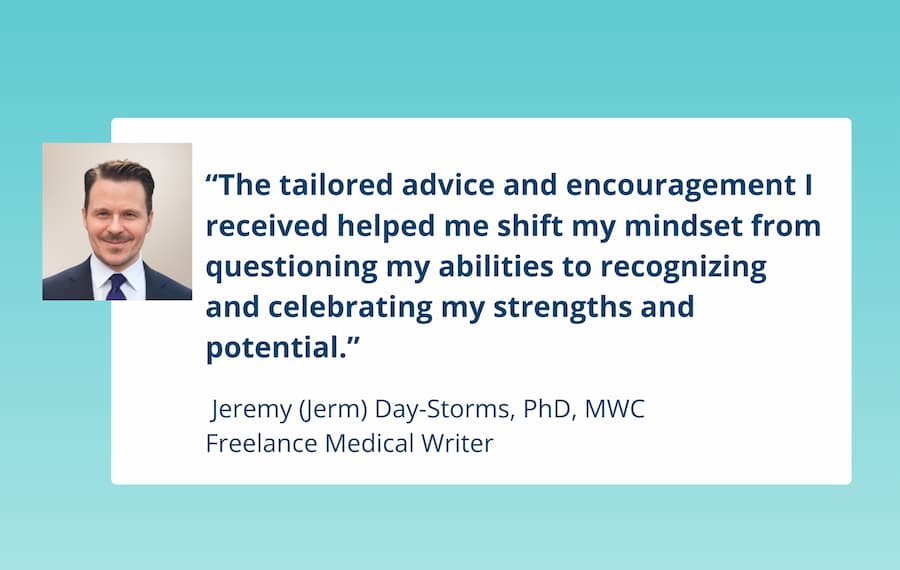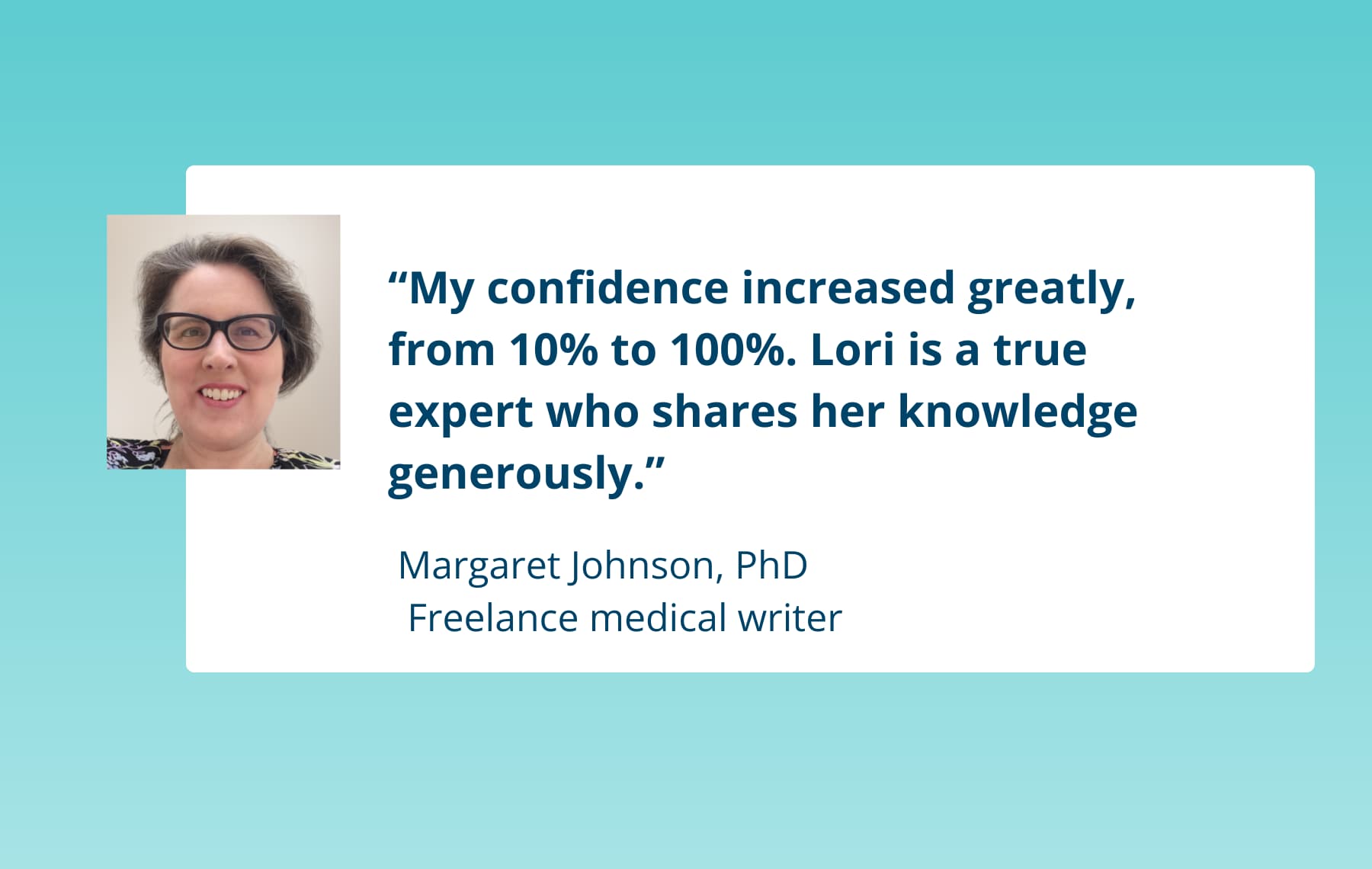Why Freelancers Need Coaching to Succeed

Key Takeaways
- Coaching gives your structure, accountability, and a clear marketing plan that leads to steady, high-paying clients.
- A coach helps you cure imposter syndrome by highlighting strengths, setting goals, and celebrating wins that build confidence.
- Having a clear specialty and identifying your best target markets let you focus your marketing and get more clients.
- The most effective ways to get clients are LinkedIn, networking, and direct email.
- Building a marketing habit with deadlines and check-ins turns procrastination into consistent progress.
Coaching helps freelancers get steady, high-paying clients by giving them a proven process plan, accountability, and confidence. By focusing on what works best—LinkedIn, networking, and direct email—a coach helps you stop spinning your wheels and start focusing on building your freelance business (How Freelancers Market their Services: 2025 Survey).
How Coaching Helps Freelancers Get Clients
Marketing coaching helps you build a stable, successful freelance business by:
- Curing imposter syndrome
- Boosting your confidence
- Combating procrastination.
Cure Imposter Syndrome
Imposter syndrome is a feeling of severe self-doubt and insecurity that strikes up to 70% of all people. Freelancers with imposter syndrome feel like frauds—even though they’re already successful, or have what it takes to be successful.
Over the years, I’ve coached hundreds of freelancers. Many of them were wrestling with imposter syndrome. But when I learned about their background and experience, and talked with them, they usually already had the right stuff to succeed. And they always had more going for them than they thought they did.
By helping freelancers see their strengths and their potential, and celebrating wins with them, these freelancers were able to cure imposter syndrome and start believing in themselves. Building a stable, successful freelance business became much easier.
Celebrating strengths and potential
When Jeremy (Jerm) Day-Storms, PhD, MWC launched his freelance medical writing business in 2022, had had everything he needed to be successful. But he doubted himself and his ability to show the world what he could do.
Through coaching, Jerm was able to voice his concerns and work through them in a safe space. After Jerm focused his freelance business and developed client-focused marketing to communicate his skills and expertise, his feeling of self-doubt and inadequacy went away.
In less than a year, Jerm got five ideal, steady, high-paying, clients. He now approaches his work with more confidence and a clear understanding of the value he brings to clients.
“The one-on-one coaching sessions helped clarify my goals and refine my marketing strategies,” says Jerm. “They offered tailored advice for my unique challenges. This personalized approach was crucial in developing a more focused and confident business strategy.”
Learn more about imposter syndrome
Do You Feel Like an Imposter? Here’s the Cure
Boost Your Confidence
Confidence affects how you present yourself in your marketing, how clients see you, and how you deal with the ups and downs of freelancing. Being confident helps you show clients you can deliver the results they need, and that you’re trustworthy.
A coach will work with you to create clear goals and a marketing action plan to achieve those goals. Together, you’ll break your goals down into mini-goals and marketing actions that you control. Every marketing action you achieve is a small win that boosts your confidence.
Your coach will celebrate your wins with you, from small wins like inviting 10 people to join your LinkedIn network to big wins like getting a new client. They’ll help you see how far you’ve come and how well you’re doing. And over time, those small wins pile up, making it easier to achieve your goal and build a stable, successful freelance business.
Launching a successful freelance business during the pandemic
When Margaret Johnson, PhD, started freelancing in 2019, she had strong experience. But like most new freelancers, Margaret didn’t know how to get the clients she deserved.
Margaret had two clients but they didn’t pay her well. To make a living as a freelance medical writer, she needed more clients and better clients.
Then COVID-19 swept across the United States and the world. Succeeding as a freelancer got harder.
Coaching helped Margaret learn the basics of marketing and networking, and the norms of medical writing. She found being able to ask question about things she was stuck on, like how best to reach out to potential clients, especially helpful.
Despite the COVID-19 pandemic, Margaret got four new high-paying clients within a few months. Three of these clients have become steady clients. Now, Margaret has as much work as she wants and even has to turn down work occasionally.
Learn more about confidence
7 Ways to Boost Your Confidence as a Freelancer
Combat Procrastination
Clear goals and small actions to achieve them, and a coach who gently pushes you to do your marketing, will help you turn procrastination into progress. A coach will create a plan with deadlines and check in regularly to make sure you’re staying on track. Those deadlines will be based on what’s realistic for you.
A coach holds you accountable for meeting your deadlines, checking in to see what’s been completed and helping you troubleshoot any roadblocks. Instead of spiraling into guilt or frustration when you make a mistake, your coach will support you and help you figure out what to do better next time.
Knowing that your coach will be checking in motivates you to follow through, even when you don’t feel like working on marketing. You’ll procrastinate less because you’ll have someone rooting for you to succeed—and holding you gently accountable when you fall behind.
Choose Your Specialty
Choosing the right specialty is the first step in freelance success. Instead of trying to appeal to everyone, a coach will work with you to assess your skills, background, and experience, and help you choose an in-demand specialty where clients can pay you what you’re worth.
Once you have a clear specialty, marketing becomes so much easier because you hone in on the clients who are most likely to hire you based on your skills, background, and experience.
But choosing a clear specialty isn’t always easy. Medical writing (my specialty), for example, is an in-demand specialty. But there are five different types of medical writing:
- Medical and scientific
- Continuing medical education
- Regulatory
- Consumer health and patient education
- Marketing and public relations.
If you have a clinical or scientific background, clients are most likely to hire you for medical and scientific writing, continuing medical education, and regulatory writing. But if your background is communications, journalism, or English like me, you’re most likely to succeed in consumer health and patient education and marketing and public relations.
A coach who’s been working in medical writing for decades understands the different types of medical writing and can help you focus on the type(s) of medical writing that will help you build your business faster.
Clarifying your target markets
Once you choose your specialty, you need to figure out which target markets to focus on. A target market is a group of similar clients, like medical communication agencies.
Knowing who you’re targeting lets you customize your marketing messages and tools to those specific clients. So your marketing speaks directly to them.
For example, if you’re a freelance medical writer specializing in medical and scientific writing for medical communication agencies and medical education agencies, your marketing will look very different than marketing for a freelance medical writer focusing on consumer health and patient education for hospitals/health systems and disease-focused health associations.
A coach can help you understand your specialty and target markets within your specialty.
Learn more about freelance specialties
Attract Your Ideal Clients with a Clear Specialty
Focusing on what works best
Once you’ve chosen your specialty and target markets, your coach will help you create marketing messages and tools that speak directly to the clients you work with or want to work with. By focusing on what these clients need and how you can meet their needs, your marketing will be professional, not pushy.
You’ll be able to attract steady, high-paying clients with less work and in less time. Because when clients see your marketing, they’ll think, “This is the freelancer for me. They understand what I need and have the expertise and experience to help me.”
Your coach will focus on what works best in marketing a freelance business, so you don’t waste your time or energy. LinkedIn, networking, and direct email are the best ways to get clients, according to How Freelancers Market their Services: 2025 Survey. You also need a website and to do targeted follow-up.
Targeted follow up means staying touch with clients who say they’re interested in your services but haven’t hired you yet. It’s an easy way to get more of the clients you deserve—because up to 90% of the time, clients aren’t ready to hire a freelancer when you first contact them. But many clients are likely to need your help within 12 months. If you do targeted follow up, the client will think of you first when they’re ready to hire a freelancer.
Making the dream of freelancing a reality
 Kathy Adamson, DVM, dreamt about starting a freelance medical writing business. But her fear of marketing almost kept her from achieving her dream.
Kathy Adamson, DVM, dreamt about starting a freelance medical writing business. But her fear of marketing almost kept her from achieving her dream.
During a course she took on freelancing, she realized how important marketing would be to her success. But as a “science person,” Kathy had no idea how to find clients.
By working with Lori, Kathy learned that marketing that works for freelancers is professional, not pushy. Focusing on the needs of her clients and how she could help clients meet their needs made marketing easier and more comfortable for Kathy. Her confidence and her business, which she launched in 2021, grew.
“Lori provides an absolutely goldmine of information, skills, and step-by-step methods for freelancers,” says Kathy. “My confidence in my ability to succeed as a freelancer skyrocketed after working with her.”
Building the Marketing Habit
Making time for marketing is a struggle for most freelancers. But when you make marketing a habit, it becomes much easier.
Coaching gives you a structure to follow, based on how you work best, and deadlines to meet, so that you do your marketing. As you complete marketing actions and make progress toward your goals, you’ll be motivated to do more marketing.
When you slip, your coach will let you know that this is okay. They’ll help you get back on track.
By the end of your coaching program, you’ll have built the marketing habit. And you’ll have a process in place to keep doing your marketing.
Learn More About Making marketing a habit
The Habit that Will Make You a Freelance Success
Get the Steady, High-Paying Clients You Deserve
Coaching takes the guesswork, stress, and frustration out of marketing. It helps you see your full potential and gives you the jumpstart you need to create the compelling, client-focused marketing that will help you get the steady, high-paying clients you deserve.
Updated October 2025 by Lori De Milto
Learn More About Coaching
Content from The Mighty Marketer
Do You Feel Like an Imposter? Here’s the Cure
7 Ways to Boost Your Confidence as a Freelancer
Attract Your Ideal Clients with a Clear Specialty
The Habit that Will Make You a Freelance Success
About the featured freelancers
Jeremy (Jerm) Day-Storms, PhD, MWC
Margaret Johnson, PhD
Kathy Adamson, DVM
FAQ
Q: How does coaching help freelancers get better clients faster?
A: Coaching creates a focused plan, clear messaging, and a repeatable process for outreach and follow up. This helps you reach the right clients and convert interest into paid work.
Q: What type of marketing should I do to get clients?
A: Focus on LinkedIn, networking, and direct email. Support these with a clear website and targeted follow up for 12 months after first contact.
Q: How does a coach help with imposter syndrome and low confidence?
A: A coach reviews your skills and experience, sets achievable goals, and tracks wins. This builds your belief in your value and improves how you present yourself to clients.
Q: How do I choose a specialty and target markets?
A: Match your background to client needs, then narrow to one or two specialties and two to four target markets. Build messages that show how you meet those clients’ needs.
Q: What does accountability look like in a coaching program?
A: You set deadlines, break goals into weekly actions, and get regular check-ins. Your coach helps remove roadblocks and keeps you on track.

